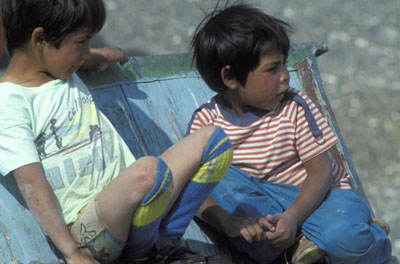Applying Social Guarantee Approaches in the Eastern Caribbean

Summary
The World Bank’s 2006 Poverty Assessment Study outlined weaknesses in poverty reduction strategies in St. Lucia common to Caribbean countries. The St. Lucia Poverty Reduction Fund in the Ministry of Social Transformation wanted to join an ongoing Organization of American States (OAS) program1 to better learn how Chile had implemented “social guarantee”2 approaches to improve social programs. The World Bank’s South-South Facility agreed to support St. Lucia’s as well as St. Vincent and the Grenadines’ participation in a joint OAS-World Bank knowledge exchange bringing together leaders of Chilean social programs with ministry and social program practitioners from seven Eastern Caribbean countries.3
“For us, it was about [learning] how we can replicate this kind of initiative on a much wider scale, and the specific human resource and financial challenges that that poses,” said Mr. Donovan Williams, Permanent Secretary with the Ministry of Social Transformation in St. Lucia.
The exchange increased awareness considerably about social guarantee approaches across the Eastern Caribbean, and participants learned skills to strengthen the policy environment for social guarantee approaches. “The participants learned to conduct something like ‘gap analysis’ because [to implement social guarantees] you have to look at what is missing in policy domains, such as legal, institutional, instrumental, and financial to see what is lacking,” said Maximillian Shen Ashwill, Social Development Specialist who led the World Bank’s participation in the exchange.
Thirty-five participants learned to use tools to take part in a virtual forum and developed a community of practice (CoP) to facilitate ongoing sharing among social development ministries and agencies in Chile, St. Lucia, Barbados, Jamaica, Suriname, St. Kitts and Nevis, Trinidad and Tobago, and St. Vincent and the Grenadines. “A vibrant community of practice was launched,” added Mr. Ashwill. “People have been learning from each other and much of it is because people met face-to-face and know each other [from the conferences held during the exchange].”
Beneficiaries / Participants
Caribbean Island nations suffer from significant weaknesses in their poverty reduction strategies, as outlined in the World Bank’s 2004 Social Protection Country Review and its 2006 Poverty Assessment Study for St. Lucia. Jamaica and Trinidad and Tobago were the only Caribbean countries using social policies modeled on the innovative Chilean approaches that had implemented effective health and pension programs based on social guarantees—a set of legal and administrative mechanisms outlining specific citizen entitlements and obligations.
St. Lucia had successfully incorporated aspects of Chile's Puente Program in its Koudemen Ste. Lucie Program, but the St. Lucia Poverty Reduction Fund, under the Ministry of Social Transformation, wanted to explore ways to increase the use of these rights-based approaches. The Government of St. Lucia asked the World Bank to help it join other Caribbean governments in learning more about the procedures and best practices that Chile had used. Seeing the possibility to transfer this knowledge more broadly, the World Bank’s South-South Trust Fund agreed to support St. Lucia’s and St. Vincent and the Grenadines’ participation in an Eastern Caribbean-wide knowledge exchange organized by the Organization of American States (OAS).4
The resulting joint OAS and World Bank knowledge exchange brought ministry representatives and social program practitioners from Barbados, Jamaica, St. Kitts and Nevis, St. Vincent and the Grenadines, Suriname, Trinidad and Tobago, and St. Lucia together with leaders and practitioners of Chile’s Regime of Explicit Guarantees in Health (REGH) program and Puente Program, among others, to learn how to apply social guarantees for poverty reduction in the Caribbean nations.
Moving forward
The CoP and knowledge-sharing platform and website developed for the exchange continues to inform country efforts to apply social guarantees to social programs. The OAS has contributed substantial resources to this agenda (much more than the Bank) and will continue to do so.
The exchange was linked to country priorities in St. Lucia and addressed some of the country’s shortcomings regarding poverty reduction as identified in the World Bank’s 2006 Poverty Assessment report. The CoP created by this exchange represents perhaps the greatest opportunity to help St. Lucia, St. Vincent and the Grenadines, and the Eastern Caribbean region to improve poverty reduction efforts. These development practitioners have met face-to-face, established relationships, exchanged ideas, and established a common working platform and network. Forty participants unanimously responded “yes” when asked at the end of the St. Lucia conference whether they saw the need for increased training and information through the knowledge platform and community of practice.
This exchange and the CoP form a base for future technical cooperation with other Caribbean countries. In the next phase the program will be expanded to other Caribbean nations, followed by monitoring and evaluation of all activities and results.

 China
China Colombia
Colombia Denmark
Denmark India
India Indonesia
Indonesia Mexico
Mexico Russian Federation
Russian Federation Spain
Spain United Kingdom
United Kingdom